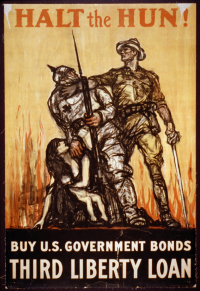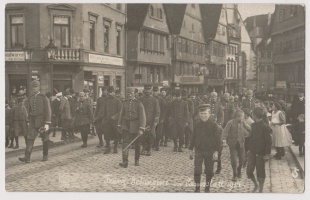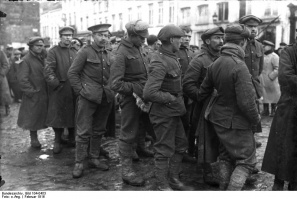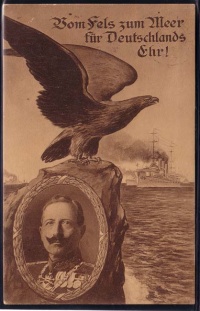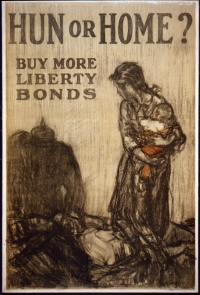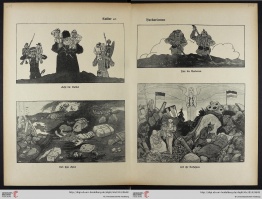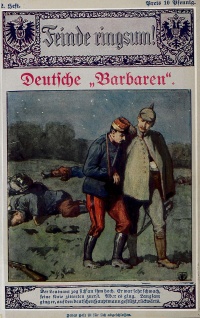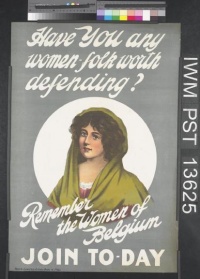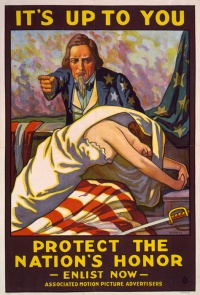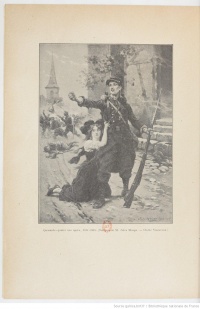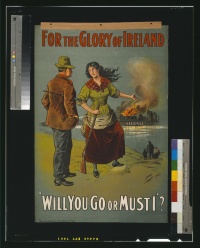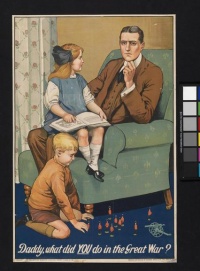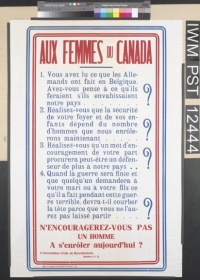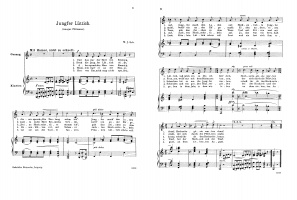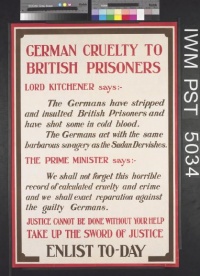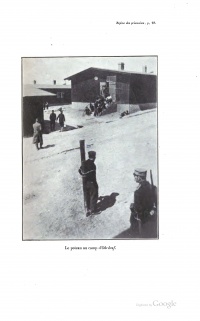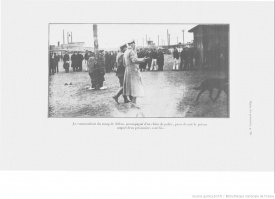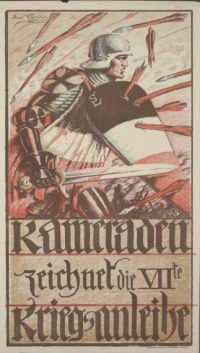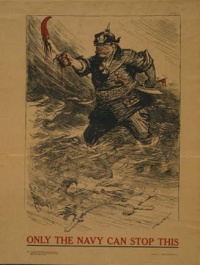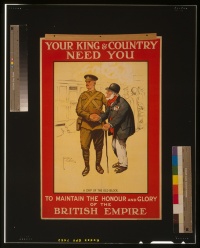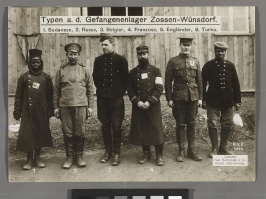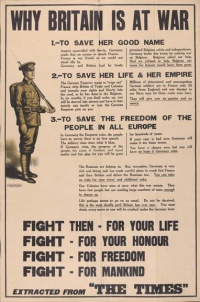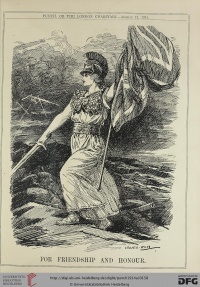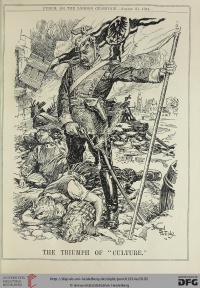August 1914: Writing about emotions in Berlin↑
On 27 August 1914, Käthe Kollwitz (1867-1945) wrote in her diary: “I was very moved to read that French soldiers who have been taken prisoners of war cover their faces in shame.” She was equally touched and elated when she read about acts of sympathy on the battlefield: French soldiers sparing wounded German soldiers, German soldiers marking houses in Franc-tireur villages: “Spare! Here lives an old woman who has been kind to me” or “Spare! Here lives a woman who has just given birth”. These traces of kindness made “heavenly sounds” in all the “heroic stupor” and “unnaturally overeffusive state of mind” that seemed to have a solid grip on everyone during the first weeks of war.[1]
Kollwitz had witnessed “cheering and singing” when soldiers left for East Prussia, “the loved and embattled” region at the German-Russian borders. She had also seen her eighteen-year-old son being sworn in at a solemn flag ceremony. Both her sons had volunteered, and she could not but feel impressed and affected by their seriousness and excitement. She discussed her twenty-year-old niece Regula who was “full of rage” about the fact that her family had only provided one soldier while others had given more. And she commented on an article by Gabriele Reuter (1859-1941), a well-known author who had publicly spoken about women’s “ecstasy of sacrifice”. Kollwitz profoundly disliked and questioned the notion of heroism that accompanied Reuter’s appeal. Two weeks earlier, however, she had denounced “cowardice”, declaring herself “ready for sacrifice”.[2]
Käthe Kollwitz was not a nationalist. She was married to a social-democrat doctor who treated poor patients in a working-class area of Berlin. Although she never joined the party, she sympathised with the socialist ideals, and attended mass rallies against war, inflation and political discrimination of low-income citizens. As an artist, she worked for left-wing publishers and movements. Chauvinism was completely alien to her, and she was not even overly political. Before August 1914, her diary was dedicated mostly to private matters. In July, she happily vacationed at the East Prussian seaside, enjoying the good weather. War, economic hardship and unequal voting rights seemed distant issues and nothing to be bothered about during the hot summer months.[3]
War must have come as a surprise to her and changed her life dramatically. She joined the social-democrat women’s efforts to support needy families whose male breadwinners had been conscripted. Together with her sons and their friends, she read stories and novels about former wars, predominantly those of 1813/15 and 1870/71. She was not seeking acts of heroism or military bravery. Rather, she was eagerly searching for accounts of humanity on the battlefields, of soldiers treating enemies, both military and civilian, in an honourable, generous, and kind manner. She desperately wished to see war as a civilised affair, devoid of brutality, cruelty, and beastliness; she hoped that the new war would be conducted along these lines, although she had an inkling that things might turn out differently.[4]
At the same time, Kollwitz could not help feeling “excited”. She experienced a “new beginning” in her own life and was full of admiration for the young volunteers and their unbridled enthusiasm: “The young ones are undivided in their hearts. They give themselves cheerfully. They give themselves like a pure smokeless fire rising high up the sky.” Yet her feelings were mixed: seeing her sons and their friends prepare for the war “hurt like hell and was, at the same time, wonderfully beautiful”. Although she was prepared to sacrifice her loved ones, she did not share the heroic attitude that Reuter preached and demanded. She felt that this kind of heroism would not last:
By March 1915, hundreds of thousands of soldiers had been killed or injured, and millions more would die too. Käthe’s son Peter Kollwitz (1896-1914) had fallen in Flanders two months after he had started his basic training, leaving his parents heartbroken. The public joyful cheering had been succeeded by a more sombre attitude. City dwellers started to suffer due to shortages of food and basic products. Women rioted against rising potato prices, and in November 1915, ten thousand Berliners protested publicly against the war. Even middle-class households found it increasingly difficult to keep their stoves burning.[6] Patience and optimism faded, and resentment grew against war profiteers, social inequality and a government that did not act to protect the citizens’ basic needs. Official propaganda worked hard to counteract this change and to convince people that further suffering and sacrifice were necessary. Faith in the military leadership evaporated during the summer of 1916, when the Russian, British, and French armies surprised the Central Powers and launched bloody offensives on the Eastern and Western fronts. Within five months, the battle of the Somme had cost Germany 600,000 casualties, Britain 420,000 and France 200,000.[7]
It has often been questioned how wartime societies managed to endure mass death, hunger, and scarcity without disintegrating. Answers could be found in the propaganda efforts of governments and civil associations that sought to generate public support and a sense of perseverance and meaningfulness. In all warring countries, the state propaganda apparatus vastly expanded and acquired more and more means and tasks. Concepts of mobilising nations and stirring up enthusiasm, or, at least, preventing defeatism and gloominess, were remarkably similar, focusing on the quest for unity and coherence; patriotic spirit; strong will-power; belief in traditional values and national honour; religious faith; and confidence in one’s own government and leadership. According to the official mantra, the war demanded everyone’s sacrifice that would finally bring victory and lasting happiness to the long-suffering nation.[8]
Propaganda thus targeted people’s emotions, moods and passions. Its effectiveness was based on certain elements also encountered in Käthe Kollwitz’ diary. When Gabriele Reuter wrote about the “ecstasy of sacrifice” she referred to an established discourse of patriotism that had been widely disseminated since the Napoleonic wars in the early 19th century.[9] The exhortation and admiration of young men’s voluntary enlistment dated back to that era. The sense of national pride that was displayed by people publicly celebrating real or alleged military victories was part of the nationalism lexicon as it had been drafted during the long 19th century. And the feeling of shame that overwhelmed prisoners of war (POWs) while they were being marched through foreign streets and city squares drew on the very same semantics of national honour that had to be protected by male soldier-citizens under all circumstances.
As crucial concepts influencing wartime emotions, honour, shame and sacrifice deserve closer scrutiny. This starts with a semantic analysis of political and diplomatic communication during the July crisis, and proceeds to encompass wartime propaganda, both verbal and visual. But it also sheds light on social practices of shaming and humiliation in which citizens engaged during the war. Those practices lend evidence to the power that honour and shame held over people’s minds and souls. It will be argued that the war built on a moral economy of feelings and attitudes that had been developed long before its outbreak. It utilised and radicalised those feelings to a previously unknown degree but it also helped to destroy the very essence of honour and shame: the idea of a shared moral universe resting on notions of equality, chivalry and fairness.
Honour and humiliation in political communication↑
In July 1914, honour, shame and humiliation were established and well-known concepts within international relations. They had been taught to politicians and diplomats by university lecturers or by their seniors, and had long since been a staple in inter-state communication.[10] Professor Heinrich von Treitschke (1836-1894) was one of the experts on moral laws informing politics. Lecturing at Berlin University in the 1880s and early 1890s, he stressed the concept of the state as the dominant bearer of sovereign power that had to be enacted and safeguarded by all means, including war. Treitschke’s state was imbued with moral meaning in a Hegelian sense, as much as politics was governed by moral laws. According to those laws, the state possessed and displayed a highly developed sense of honour. Anyone who insulted this honour had to bear the consequences. Honour was equivalent to power and had to be publicly acknowledged: “State power has to stand proud and brilliant and cannot even symbolically be contested.” “Any insult offered, even if only outwardly, to the honor of a State, casts doubt upon the nature of the State.” Therefore, “if the flag is insulted, the State must claim reparation; should this not be forthcoming, war must follow, however small the occasion may seem; for the state has never any choice but to maintain the respect in which it is held among its fellows”[11]
After 1914, British politicians and academics were keen to interpret those views as a particularly German way of thinking, criticising Treitschke for having drafted a “new German theory of the State”.[12] This theory, however, was neither new nor exclusively German. Otto von Bismarck (1815-1898) had argued along the same lines since the 1850s, when he desperately tried to convince Prussian conservatives that politics was about state interests, not about personal sympathies or antipathies (which he called “romantic”). Instead of such romanticism, the state’s interests dictated diplomatic moves and backed international relations. Realpolitik was about defining those interests and seeking the best way and the appropriate allies to serve them. As Bismarck saw it, this was common knowledge among all European governments even if they draped their politics with legal or emotional “deductions”.[13]
Honour, as a marker of state sovereignty, was part and parcel of such Realpolitik, and 1914 serves as a case in point. The manifesto of the Austrian Emperor, issued on 28 July 1914, justified the war against Serbia as being “in the defense of the honour of my Monarchy”. When the Russian ambassador at Vienna announced his country’s military mobilisation on 29 July, he added that Russia’s honour as a major power had been slighted, and urged the nation to take the necessary steps. This allegation was refuted by the German Emperor who, in a telegram to the Tsar, assured him that “nobody is threatening the honour or power of Russia”. Nicholas II, Emperor of Russia (1868-1918), however, was not convinced. His manifesto of 2 August not only referred to Russia’s duty to protect Serbia: “We must also safeguard the honour, dignity, and integrity of Russia and her position among the Great Powers.” For his part, Wilhelm II, German Emperor (1859-1941) explained on 5 August that he was “forced to draw the sword in order to ward off an unjustified attack and fight for our national honour”. A day later, he issued a proclamation to the German people, in which he argued that Germany’s “power and honour” would be lost if the nation allowed its major friend and ally, the Habsburg Empire, to suffer “humiliation”. On the very same day, the British Prime Minister Herbert Henry Asquith (1852-1928) told the House of Commons:
Those words were quickly translated into images printed in newspapers and posters, postcards and brochures with wide distribution and circulation. They were also communicated in lyrics and poems, again, by all sides involved. One of twenty-six-year-old Rupert Brooke’s (1887-1915) war sonnets, which earned him the attention of the First Lord of Admiralty, Winston Churchill (1874-1965), and an appointment as a temporary Sub-Lieutenant in the Royal Naval Volunteer Reserve, was ‘The Dead’: “Honour has come back, as a king, to earth / And paid his subjects with a royal wage; / And nobleness walks in our ways again; / And we have come into our heritage.”[15]
As if he did not quite trust this reappearance of honour, British Foreign Secretary Sir Edward Grey (1862-1933) continuously referred to “our respect and good name and reputation before the world”.[16] Using “honour” as a synonym for “prestige” and “reputation” was nothing unusual: sociologist Max Weber (1864-1920) had done so in his theoretical writings. He had thus modernised a concept that seemed somewhat alien to him, in a world allegedly governed by the rational assessment of prosaic interest. According to Weber, honour’s anachronism largely stemmed from its roots in a society composed of estates rather than market classes, and from its emotional thrust. In his passionate wartime speeches, however, Weber repeatedly referred to honour as a given fact that was, in common opinion, “rooted in the heart” and “physiologically felt”.[17]
Even those who criticised the decision to go to war in 1914 did not doubt that honour was a powerful and legitimate emotional and moral precept. Although members of the British Labour Party did indeed question the government’s argument about honour compelling the country to go to war, they did not dismiss honour as a valid motive and reason to take up arms. James Ramsay MacDonald (1866-1937) proclaimed in the House of Commons on 3 August, “If the nation’s honour is in danger, we would be with him” (meaning the Foreign Secretary, who had defended the decision to enter the war on exactly those grounds).[18] David Lloyd George (1863-1945), then Chancellor of the Exchequer, supported the decision, yet not without conceding
Chivalry against barbarism: Gendered concepts of honour and shame↑
Why is it, then, that European monarchs, statesmen, and politicians all referred to honour in 1914, and what exactly did they mean? Asquith’s quote of 6 August provides a clue: alluding to the 1839 treaty that bound Britain (no less than Prussia/Germany and other European nations) to safeguard Belgium’s neutrality and independence, he explicitly compared honour to private obligations “in the ordinary concerns of life”. By deliberately linking national honour to personal honour he drew attention to the underlying culture that pervaded 19th and early 20th century Europe.
Within that culture, honour bore a powerful, but multifaceted meaning. Honour was at stake when journeymen got into fights about what they perceived as insults; honour was part and parcel of a merchant’s personal and professional life; honour was protected by laws that allowed workers to be immediately fired when they dared to offend their employer or a member of his family. The most rigid and conspicuous concern about honour reigned among the middle classes and the nobility. Over time, these circles had developed a code of honour, a point d’honneur, extremely sensitive to any transgression, demanding strong action on the occasions when the code was violated.
The aristocratic-bourgeois code of honour and the feelings that it produced and nourished was a double-edged sword. On the one hand, it might be regarded as an artificially exaggerated means of drawing attention and giving importance to one’s own life and social standing. Every minute detail seemed to matter: every look, gesture and word. This could have a disciplining effect in that everyone was cautious and sought to avoid the kind of behaviour that might be considered to be insulting. Yet at the same time it might lead to personal conflicts and provocations being taken to a disproportionate and life-threatening level of seriousness. On the other hand, the honour code can be viewed as offering precisely those means of mediation and control that conflicts needed in order to be dealt with in a respectful way. Even though some kinds of insults could not be mediated (such as adultery, or a slap in the face), there were many other kinds open to mediation. The duel itself was fought according to strict rules that guaranteed the equality of chances and risks, and set limits to the violence employed during the fight. Most duels actually ended without a drop of blood being spilt. They even ended in perfect harmony, if we believe those duelists who reported on their feelings during and after the event. The fight had not restored only the moral order that governed upper-class men’s behaviour, but also the balance between the two opponents. Each one had preserved his dignity, showing courage and determination and acting in accordance with his principles. Furthermore, the duelists had accepted each other as equals, despite and beyond the initial conflict. The duel itself was regarded as an act of mutual respect: it was based on the notion of equality, both in terms of means and social status, and it sought to reaffirm due respect that had been withheld.[20]
Personal honour set the precedent for national honour. To the Prussian officer and acclaimed military theorist Carl von Clausewitz (1780-1831), wars were nothing but “extended duels” that had to be declared and conducted in accordance with the code of honour.[21] Even if modern wars turned out to be essentially bloody and violent means of asserting and imposing power, they should nevertheless maintain elements of chivalry and honourable behaviour. As they were fought between enemies that still considered themselves members of the same European tribe, basic rules of respect and recognition were supposed to prevail. This is how German students imagined the war when they voluntarily enlisted in 1914: as if they were going “on Mensur”, meaning fighting a students’ duel in the half-brazen, half-noble tradition of academic youth culture. Cambridge students entered the war with similar ideas, eagerly abandoning the cricket ground for the field of honour.[22]
While young men regarded the war as a heroic duel, a forty-six year-old artist and mother such as Käthe Kollwitz harboured ideas of chivalrous soldiers protecting or saving unarmed civilians, women, and children. Meanwhile, the wider public indulged in the sight of modern knights who fought the war up in the skies – with eye contact and as perfectly mannered gentlemen.[23] Down on the ground, Ernst Jünger (1895-1998), a young German officer deployed on the Western front, recorded in his diary how, despite increasingly unbearable conditions and abounding violence, soldiers recognised and admired bravery on every occasion they encountered it, even when it concerned enemies. From time to time, they negotiated periods of truce in order to recover dead and wounded comrades, and they even used ceasefires over Christmas or Easter to fraternise with enemy soldiers.[24]
These views were not shared by the official war propaganda that painted the enemy in the darkest colours. Enemy soldiers on all sides were abhorred as mean, brutal, treacherous and cowardly. In the Anglo-Saxon world, the “rape of Belgium” and German warfare against civilians, cities, and cultural treasures like the Louvain library provoked outrage. British newspapers published drawings titled “The March of the Huns”, and sarcastically mocked the “Triumph of ‘Culture’ ” which consisted in German soldiers slaying women and children.[25] The French propaganda issued a series of images depicting German soldiers violating and mutilating French women and raiding their homes. Les Boches were shown to be despicable animals emitting a disgusting stench.[26] Even American posters urging citizens to subscribe for “liberty loans” used the image of savage German soldiers laying hands on young girls and mothers.[27] Since no enemy soldiers entered the country during the war, German propaganda could not retaliate, but instead focused on German soldiers being generous and compassionate, feeding elderly people and giving presents to children. Allied soldiers, on the reverse, were caricatured as unable and drunk, indulgent and laughable.[28]
While such a strategy aimed at dishonouring the enemy by depriving him of masculine traits and virtues, French and British propaganda not only pilloried the German-Prussian soldier as a brutish rapist, but at the same time called on their own male citizens and citizen-soldiers to abide by the honour code. Instead of helplessly enduring the German atrocities and watching their wives, sisters and daughters being violated, they should defend both their own honour as husbands, brothers and fathers, as well as national honour. Quite outspokenly, personal honour and national honour were thought to be synonymous. To protect female and family honour and shield women’s sexual integrity was part and parcel of what men were supposed to do and what earned them honour. Since the nation, too, had to be defended and kept pure and safe, it was the men’s job to go out and fight the aggressor, thus upholding national honour.[29]
But it was not just propaganda that sought to disseminate a strong commitment to honour. All armies upheld rigid codes of honourable conduct and used numerous shaming practices to punish those who did not comply. In British and Dominion armies, minor offences fell under Field Punishment No. 1 that was extensively applied: the culprit was tied to a post or the wheel of a gun carriage becoming a public spectacle of humiliation. Similar forms of shameful exposure were applied in the German armies.[30] Military courts tried to punish what was considered to be shirking and betraying true comradeship and patriotic duties. Deserters were treated with utter contempt; they figured as dishonourable traitors and cowards who deserved severe punishment and public shaming. The worst of all was a soldier who defected to the enemy. Time and again, officers made clear that such defectors would be treated like scum by the enemy. No army could or would appreciate traitors who turned against their own comrades and country.[31]
The public displayed nothing but contempt for those who shunned their patriotic duty. Propaganda posters showed women (and children) reminding men of their obligation and questioning their sense of bravery. In Britain, women handed out white feathers to those who did not enlist voluntarily before 1916.[32] Young men not wearing a uniform were considered cowards, shying away from their most solemn task: to protect the honour of the fatherland and, with it, the honour of its women.
By shaming them in public, women forced men to recognise and live up to traditional gender roles and characteristics. Men in turn complained about women’s lack of empathy and love. In 1917, the Austrian-Hungarian officer Andreas Latzko (1876-1943) anonymously published an account of war at the Isonzo front (where he had served in the Imperial and Royal Army until 1916). One of the protagonists talked about the “great disillusionment” of the war which did not concern the war itself but women’s attitude: instead of protecting their sons and defending their husbands, they smiled and threw roses and waved their handkerchiefs. “They sent us – sent us! Because every one of them would have been ashamed to stand there without a hero.” To meet this expectation, men enlisted, became heroes and returned with a medal that increased their appeal: “His girl will like him better, and the other girls will run after him, and he can use his medal to hook other men’s women away from under their noses.”[33]
When men expected women to “rescue” them from the horrors of war, they referred to women’s role as devoted mothers and loving wives. This seemed to be wildly at odds with women’s alleged display of vanity and their desire “to be in fashion” or “in style”. This view, however, proved blind to what was really at stake: the gendered division of honour and shame. Honour posed quite different demands on men and women. Being an honourable man was associated with multiple meanings, depending on class, profession and situation, but it was always accompanied by the obligation to display courage and determination in order to avoid shame and humiliation. For women, shamefulness was considered a genuine virtue and character trait. Girls were taught from a young age to lower their gaze, avoiding everything that might taint their immaculate status. A shamed woman was a fallen woman who had compromised her honour by behaving indecently or allowing other people to treat her indecently. A dishonoured woman could do nothing to restore her honour, she had to rely on her father, brother, fiancé or husband to act in her place. If the man lacked courage, the woman’s honour was jeopardised. Such cowardly behaviour could not but be perceived as utterly dishonourable, shameful, and unchivalrous.
The notion of chivalry, although increasingly criticised by late 19th-century feminists, lent powerful support to the honour code, both at individual and at national level. This was evident in the language of international relations as it was spoken during the summer of 1914. To Germany, it was a matter of honour to “stand, in resolute fidelity, by our ally which is battling for its reputation as a great power” and had been humiliated by Serbian politics.[34] Russia had a different view but used the same metaphors: “little” Serbia had to be protected against the Habsburg menace. When David Lloyd George addressed a large audience at Queen’s Hall, London, on 19 September 1914, he claimed that it was “an honourable obligation” to defend Belgium’s liberty and integrity. If Britain had not come to Belgium’s rescue, “our shame would have rung down the everlasting ages”. It was not just a matter of adhering to treaties, Lloyd George insisted, but also a moral duty to help a small, weak country which had been “treated brutally” by its mighty neighbour. In short, it was an act of chivalry, and the politician did not forget to mention the slaughtered “women and children” who had to be avenged.[35]
Allied propaganda used even blunter sexual allusions to describe what happened to Belgium and Northern France in August 1914. After Germany’s invasion, the public in France and Britain was flooded with images of female bodies that had been raped and mutilated by brutish German soldiers. As much as the German administration tried to discredit them as crude distortions of reality, they were extremely effective in stirring up people’s moral sensibilities.[36] Even some German intellectuals, among them Max Weber, referred to Belgium’s “rape” and “castration”, although in a rather symbolically and critical manner.[37] In his 1915 address to teachers, Professor Philipp Witkop (1880-1942) offered an altogether different perspective. He strongly recommended a song that described the fall of Liège or Lüttich in barely concealed sexual terms. “Jungfer Lüttich” who was courted by Germany chose another lover (France), before eventually (and lustfully) falling for the German invader who took her by force. According to Witkop, the song served as an excellent example combining current and traditional war lyrics and should be sung in every classroom.[38]
Such pornographic allusions, however, did not find everyone’s approval. As early as August 1914, social-democratic newspapers warned against brutalisation and abandoning civilised standards. They reminded their readers, many of whom were already on active duty, to remain “humane” on the battle field and not forget that they were fighting “class comrades” on the enemy side. What mattered most “for us proletarians”, was to “show chivalry” resisting any type of cruel behaviour on the battlefield as well as at home.[39]
POWs, Homecoming, and the End of Sacrifice↑
Interestingly, the Vorwärts article started by drawing attention to POWs that had suffered the fate of “falling into our hands”. Germany had indeed taken thousands of prisoners in the early days of the war, who were interned in camps and labour battalions on German territory. Other countries followed suit, and, by the end of 1918, around 6.6 million soldiers had been taken prisoner.[40] Why was it, then, that the major social-democratic paper urged its readers to treat those prisoners “kindly and humanely”?
The way POWs were treated offers a particularly enlightening perspective on questions of honour and shame as they were negotiated during the Great War. Remembering Käthe Kollwitz’s remark about foreign soldiers hiding their faces as an act of shame, we might ask where this kind of shame originated and what those men felt ashamed of.
The 1899 and 1907 Hague Conventions had explicitly removed POWs from the theatre of war and enmity, placing them under the power of the enemy government instead of their captors. It was commonly understood that they should not be treated as enemies or criminals, but “with humanity”. During the First World War, this obligation was dealt with very differently. All governments ostentatiously praised themselves for displaying kindness, dignity and benevolence towards POWs. At the same time, they attacked the enemy for denying their own soldiers the same generous and honourable treatment. A 1916 German family journal reveals:
The initial staring had actually been widely reported. Every time that POWs were shown to the public, large crowds gathered in order to catch a glimpse, sneer, or spit at enemy soldiers.[42] Kollwitz witnessed such gatherings in September 1914, when Russians, Belgians and French soldiers arrived by train. “The French look reduced. Many small and miserable men.” She kept her distance: “All in all, this mass of captured enemies is depressing. It reminds me somewhat of Hagenbeck.”[43] Hagenbeck was a famous zoo in Hamburg that exhibited not only exotic animals but also people from far-away places, e.g. Samoans, Inuit or Nubians. While the latter usually attracted large crowds of curious spectators, some contemporaries felt appalled and reacted with indignation to what they considered to be an act of derogatory exposure.[44]
While Käthe Kollwitz obviously did not enjoy seeing POWs (or, for this matter, exotic “races”) on public display, others did. Time and again, women were criticised for behaving indecently by showing “unpatriotic” curiosity when French or Belgian soldiers were marched through cities and villages. This was deemed as dishonouring both the women and the prisoners. As much as it violated norms of female decency and shamefulness, it also served to humiliate those who had become a spectacle. Generally, staring was considered to be impolite and tactless behaviour, and children learnt from early on not to stare at others persistently (as is often their habit). Staring at POWs acquired the character of an open insult. Those who stared were in a position of power, and they did not even try to conceal it. The captured were powerless and thus had to endure being stared at – if they did not try to hide their faces. The staring actually reminded them of their impotence that could be felt quite literally. It shamed them in open daylight and publicly demonstrated that they had lost their honour or, at least, that they were no longer in a position to defend it.
In some sense, these men relived the experience of those who had been put on public display for committing a petty crime. Medieval societies had invented the institution of the pillory for people who had offended public morality. Being put in the stocks or a pillory, set up in the marketplace or at a crossroads, were both means of public humiliation. Offenders were exposed to everyone’s stare and comments and often received harsh treatment by those who accidentally passed by or deliberately joined the crowd to watch and cheer. As a legal device, the pillory was abolished in the 1830s. Semantically, though, it has lived on up to the present (indicating its long-lasting impact on people’s imagination and sensibilities).
Being marched through foreign streets and squares, still wearing their uniforms but without their rifles (widely praised as the infantry soldier’s pride)[45] forced men to recognise their loss of power and control over their own lives. They were in the hands and at the mercy of the enemy now, since they had lost the war or, at least, a battle. Although international law protected them and obliged the enemy government to treat them honourably, they could not help but notice that they had failed in their duty to defend home, hearth, and fatherland. Their efforts had been insufficient, and, as a consequence, they felt the blame and shame.[46] Confronted with expectations of manly strength, courage, and determination, defeat and captivity were perceived as clear signs of emasculation.
Questions of honour and dignity were present every time the issue of POWs was raised. Right at the beginning of the war, people debated whether prisoners could and should be discharged or given more personal freedom after pledging their word of honour. According to the Hague Conventions, soldiers, rank and file as well as officers, could ask or accept the offer of parole after solemnly declaring that they would stick to the obligations that accompanied paroling. Such custom had been well established in early modern military conflicts conceived as cabinet wars. The new type of national wars that emerged during the 19th century, however, posed different demands. Loyalty to the king did not end in captivity, and national honour gained priority over personal honour. Already in 1870, the Prussian Chancellor von Bismarck had complained about the large number of French officers who had betrayed their word of honour and fled, only to be reintegrated into the French army, fighting the Germans once again. Such behaviour indicated that military officers’ professional honour code increasingly and dramatically clashed with expectations of national loyalty.[47]
Just as German law professors in 1914 preached distrust against French officers who were suspected of breaking their word of honour, all governments and national media prided themselves of meticulously abiding by the Hague rules while criticising enemy countries for harshly mistreating and humbling POWs. At the same time, however, both citizens and military administrations engaged in all kinds of shaming practices meant to humiliate and disgrace enemy soldiers. Bystanders spat in their faces, tried to beat them up or hurled insults, while prison camp guards used public floggings or tied them to a post. Meanwhile, the press published caricatures and illustrations to ridicule them based on ascribed national traits and stereotypes, or depict them as ruthless perpetrators of atrocious war crimes. Especially those who came from non-European countries or colonies encountered openly racist prejudice and contempt.[48]
Treating POWs dishonourably and as dishonourable subjects thus served as another case of how standards of civilised and potentially chivalric behaviour collapsed or were deliberately ignored in times of war. World War I set a particularly gruesome example[49] which can in part be attributed to the effect of propaganda dehumanising the enemy and outlawing him as an alien race. But propaganda was not all that mattered. The longer the war lasted, the more people experienced its hardships and violence first-hand. And the more they saw themselves as victims of the war who sacrificed life and limb, the more they felt the urge of taking revenge and retaliating if they found themselves in a position that permitted or even encouraged such acts.
While many people, men and women, had initially greeted the war with an elated sense of personal sacrifice, the “ecstasy” that some might have felt and that Gabriele Reuter had expressed so powerfully in August 1914 soon evaporated. To Käthe Kollwitz, who had resisted any ecstatic feelings but voluntarily “sacrificed” her youngest son and allowed him to enlist, Peter’s death in October 1914 was a blow from which she never recovered.[50] Young men who had offered their lives “radiating” with joy and pride and not even aware, as Kollwitz noticed with great amazement, that they were making a “sacrifice”, gradually lost the “undiluted, glorious idealism” of the early days and weeks.[51] As the war dragged on, soldiers’ morale plummeted in the face of increasing casualties, abominable conditions and harsh grievances. Mutinies, desertion, and shirking became more and more frequent and promises of imminent victory were received with growing skepticism and distrust.[52]
Meanwhile, the home front suffered from similar defects and setbacks. Internal strife was increasingly out of control. Against this background of un-ecstatic sacrifice and growing resentment, the end of fighting was hailed even by those who had suffered defeat. When the German high command urged civilian authorities to negotiate an armistice in late September 1918, no one felt surprise. Although the military had upheld the promise of ultimate victory, as in all warring countries, the fact that a more realistic approach was adopted did not come unexpectedly. Soldiers were eager to leave the battlefields and return home as soon as possible, with or without a formal permit.[53]
In Berlin, Käthe Kollwitz was busy organising their welcome. While she was impatiently waiting for her surviving son Hans to be discharged, she appealed, “in the name and on behalf of many”, to Berliners:
Her words were well received, and Berliners gathered at stations and brought flags to greet the homecoming soldiers. The dilemma as to which flag to display, however, caused some concern. After long discussions, the Kollwitz family decided against the red flag of socialism but instead hung “the dear German flag” in black, white and red. It was dear to Käthe’s heart because two sons had marched behind it, together with so many others who, like Peter, did not return. But since another new beginning was on the threshold, she added “long red republican” pennants – and a green wreath that served both as the sign of welcome and as a symbol of mourning the dead.[54]
For the left-wing artist as for most contemporaries, the homecoming soldiers had fought honourably for Germany’s honour. Even though they had been defeated they had not compromised their honour. According to public opinion, defeat did not result from a lack of courage or determination; instead, it was due to the blatant asymmetry of resources, both human and material, on the battlefields. This was how Käthe Kollwitz argued on 30 October 1918 when she publicly rejected a colleague’s call to arms. In his widely published appeal, Richard Dehmel (1863-1920), a well-known poet and writer who, at the age of fifty-one had voluntarily enlisted in the army and served until he was wounded in 1916, had urged German men to hurry to the front and defend “our people’s honour and human dignity” in a final desperate battle. In her open letter, Kollwitz fervently criticised Dehmel’s stance. Remembering her own sons’ enthusiasm and spirit of sacrifice in the autumn of 1914, she declared that those times were over. Four years of war had taught different lessons about honour, shame and sacrifice. What counted now was to build the future, and the future needed the young generation. “We did not see Russia as infamous when she agreed to the incredibly harsh conditions of Brest-Litovsk only because she felt compelled to save the remaining strength for domestic reconstruction.” In a similar manner, Germany should not feel dishonoured if the Entente decided to dictate peace rather than negotiate it under law. Instead, the nation should be proudly aware that national honour was unaffected, just as the honour of a single man who deferred to “overwhelmingly strong forces” was left intact.[55]
Conclusion↑
Throughout the war and until its very end, questions of honour, shame, and sacrifice were thus hotly debated. Serving as powerful leitmotivs of national imagination and sensibility, they gave orientation in a war that strained people’s endurance to a degree unknown prior to 1914. Propaganda definitely had its share in mapping individual and collective emotions, but it did not create or invent them. Notions of honour and shame had been deeply embedded in pre-war European societies, with marked differences of class and gender. During the war, national honour was transformed into an overarching and integrating concept calling for, and giving meaning to, every citizen’s personal sacrifice. But, as the Kollwitz-Dehmel controversy shows, the broad consensus about what honour entailed disintegrated. While most people agreed with Kollwitz about the end of sacrifice, others, such as Dehmel, favoured an honourable death over an “undignified life”.
It remains an open question whether, as Kollwitz claimed, the notion of honour really underwent a change after four years of bloody warfare. Especially in countries that considered themselves to have been treated disgracefully by others, honour and shame became battle cries against the “humiliation” suffered by those who set the terms of armistice and peace. To evoke fairness, equality and reconciliation meant to refer to an honour code that had informed diplomatic and political communication at the beginning of World War I. However, it did not account for the fact that this very code had been increasingly violated during the war, having been succeeded by a type of warfare that left less and less room for notions of chivalry and fair play and that was orchestrated on the home front by dehumanising propaganda efforts. The code had thus lost its very essence, which, under the conditions of the postwar order, could by no means be revived and revitalised.
Ute Frevert, Max Planck Institute for Human Development
Section Editor: Christa Hämmerle
Notes
- ↑ Kollwitz, Käthe: Die Tagebücher, Bohnke-Kollwitz, Jutta, (ed.), Berlin 1989, p. 158.
- ↑ Ibid., pp. 152, 158ff.
- ↑ Kollwitz, Käthe: Briefe an den Sohn 1904 bis 1945, Bohnke-Kollwitz, Jutta (ed.), Berlin 1992, pp. 63, 86-91; Tagebücher, 1989, pp. 139-148.
- ↑ The article that Kollwitz quoted in her diary was printed in the Frankfurter Zeitung, 28 August 1914. The author praised the heroic courage of German soldiers fighting regular Belgian troops (that he considered equally heroic and brave, but less well organised and disciplined), irregular franctireurs and enraged Belgian citizens, whom he described as sneaky and insidious. The image of German soldiers as “great, peaceful children” who treated the local population in a “polite, amiable and accommodating” way had already been part of the narratives told about the 1870/71 war, well-known to Kollwitz, who had read war novellas by Detlev von Liliencron in August 1914 (Kollwitz, Tagebücher, 1989, p. 153). See Becker, Frank: Bilder von Krieg und Nation, Munich 2001, pp. 361ff. Post-1870 sources, however, also contained graphic descriptions of German retaliations against franctireurs’ brutality (ibid., p. 236).
- ↑ Kollwitz, Tagebücher, 1989, pp. 151, 154, 158.
- ↑ Davis, Belinda J.: Home Fires Burning. Food, Politics, and Everyday Life in World War I Berlin, Chapel Hill 2000.
- ↑ Keegan, John: The First World War, London 1998, p. 321.
- ↑ Schmidt, Anne: Belehrung – Propaganda – Vertrauensarbeit. Zum Wandel amtlicher Kommunikationspolitik in Deutschland 1914-1918, Essen 2006; Flood, P.J.: France 1914-18. Public Opinion and the War Effort, Basingstoke 1990; Pennell, Catriona: A Kingdom United. Popular Responses to the Outbreak of the First World War in Britain and Ireland, Oxford 2012.
- ↑ Reuter, Gabriele: Was fordert der Krieg von den Frauen? in: Der Tag, 26 August 1914. See, for historical reference, Hagemann, Karen: German heroes. The cult of the death for the fatherland in nineteenth-century Germany, in: Dudink, Stefan / Hagemann, Karen / Tosh, John (eds.): Masculinities in politics and war. Gendering modern history, Manchester 2004, pp. 116-134; Colley, Linda: Britons. Forging the Nation 1707-1837, New Haven 1992, chapter VII.
- ↑ For the German-French war of 1870/71 and before see Aschmann, Birgit: Preußens Ruhm und Deutschlands Ehre. Zum nationalen Ehrdiskurs im Vorfeld der preußisch-französischen Kriege des 19. Jahrhunderts, Munich 2013.
- ↑ Treitschke, Heinrich von: Politics, volume 2, New York 1916, p. 595.
- ↑ Members of the Oxford Faculty of Modern History: Why We are at War: Great Britain’s Case, Oxford 1914, chapter 6; Joll, James: The Origins of the First World War, 2nd ed., London 1992, pp. 217f.
- ↑ Kohl, Horst (ed.): Bismarcks Briefe an den General Leopold v. Gerlach, Berlin 1896, p. 316; Rothfels, Hans (ed.): Bismarck und der Staat, 3rd ed., Darmstadt 1958, p. 94.
- ↑ The Times, 30 July 1914, p. 7; Ibid, 4 August 1914, p. 3; Geiss, Imanuel (ed.): July 1914. The Outbreak of the First World War. Selected Documents, New York 1967, pp. 280, 324; Johann, Ernst (ed.): Innenansicht eines Krieges. Deutsche Dokumente 1914-1918, Munich 1973, p. 24; Brock, Michael: Britain enters the War, in: Evans, Robert J.W. / Pogge von Strandmann, Hartmut (eds.): The Coming of the First World War, Oxford 1990, pp. 145-178, quote, p. 177.
- ↑ Brooke, Rupert: 1914 and other poems, London 1918, p. 13.
- ↑ Grey, Edward: Viscount Grey of Fallodon: Twenty-Five Years 1892-1916, volume 3, London 1935, p. 316.
- ↑ Weber, Max: Economy and Society. An Outline of Interpretive Sociology, in: Roth, Guenther / Wittich, Claus (eds.) Berkeley 1978, volume 2, pp. 932-937, 1068f.; idem: Zur Politik im Weltkrieg. Schriften und Reden 1914-1918, Tübingen 1988, esp. pp. 40, 77. For Weber’s sensitivity to the point d’honneur, see Frevert, Ute: Men of Honour. The Social and Cultural History of the Duel, Cambridge 1995, p. 182; for honour’s emotional impact, see Ibid.: Emotions in History – Lost and Found, Budapest 2011, p. 41.
- ↑ The Times, 4 August 1914, pp. 6f.
- ↑ Lloyd George, David: Honour and Dishonour. A Speech, London 1914, p. 2.
- ↑ Frevert, Ute: Ehrenmänner. Das Duell in der bürgerlichen Gesellschaft, München 1991 (Frevert, Ute: Men of Honour: A Social and Cultural History of the Duel, Williams, Anthony (trans.), Cambridge 1995); Jeanneney, Jean-Noël: Le Duel. Une Passion française 1789-1914, Paris 2004; Hughes, Steven C.: Politics of the Sword. Dueling, Honor, and Masculinity in Modern Italy, Columbus 2007.
- ↑ Clausewitz, Carl, von: Vom Kriege, in: Stumpf, Reinhard (ed.): Kriegstheorie und Kriegsgeschichte, Frankfurt 1993, p. 15. See the references in Frevert, Men of Honour, 1995, pp. 151f., as well as Jünger, Ernst: In Stahlgewittern, 30th ed., Stuttgart 1986, pp. 73, 241, 267.
- ↑ Witkop, Philipp (ed.): Kriegsbriefe gefallener Studenten, Munich 1928, p. 11; Levsen, Sonja: Elite, Männlichkeit und Krieg. Tübinger und Cambridger Studenten 1900-1929, Göttingen 2006, pp. 123ff.
- ↑ Schüler-Springorum, Stefanie: Krieg und Fliegen, Paderborn 2010, chapter II.
- ↑ Jünger, In Stahlgewittern 1986, pp. 29, 51, 64f., 95, 141f., 268; Jünger, Ernst: Kriegstagebuch 1914-1918, Helmuth Kiesel (ed.), Stuttgart 2010, pp. 51, 55, 60, 65f., 97, 220f. For informal ceasefires and moments of fraternisation, see Brown, Malcolm / Seaton, Shirley: Christmas Truce, London 1984; Eksteins, Modris: Rites of Spring. The Great War and the Birth of the Modern Age, Boston 1989, chapter III; Lipp, Anne: Meinungslenkung im Krieg. Kriegserfahrungen deutscher Soldaten und ihre Deutung 1914-1918, Göttingen 2003, pp. 185ff.
- ↑ The Times, 29 August 1914, p. 9; Punch, 26 August 1914. See Reimann, Aribert: Der große Krieg der Sprachen. Untersuchungen zur historischen Semantik in Deutschland und England zur Zeit des Ersten Weltkriegs, Essen 2000, pp. 168ff.; Schramm, Martin: Das Deutschlandbild in der britischen Presse 1912-1919, Berlin 2007.
- ↑ Rother, Rainer (ed.): Die letzten Tage der Menschheit. Bilder des Ersten Weltkrieges, Berlin 1994, pp. 468-471 (Les Atrocités Allemandes); Courmont, Juliette: L’odeur de l’ennemi. L’imaginaire olfactif en 1914-1918, Paris 2010; Demm, Eberhard (ed.): Der Erste Weltkrieg in der internationalen Karikatur, Hannover 1988, pp. 62-65; Cf. Horne, John / Kramer, Alan: German atrocities, 1914. A History of Denial, New Haven 2001.
- ↑ Harel, Véronique (ed.): Les Affiches de la Grande Guerre, Péronne 1998, p. 45.
- ↑ Demm, Karikatur, 1988, pp. 65, 68, 71; Reimann, Krieg, 2000, pp. 177ff.
- ↑ For the ubiquity of gendered notions of honour, see poems like Stehr, Hermann: Der Krieg bricht los, in: Die neue Rundschau 23 (1914), pp. 1185-1187, which calls all German men to war in order to protect children and women and the “pure bodies of your virgins” that would otherwise be violated by Russians and Frenchmen. Kollwitz read this poem to her son Hans in September 1914, without further comment (Kollwitz,Tagebücher, 1989, p. 161).
- ↑ Englander, David: Mutinies and Military Morale, in: Strachan, Hew (ed.): The Oxford Illustrated History of the First World War, Oxford 1998, pp. 191-203, illustration p. 192; Putkowski, Julian / Sykes, Julian: Shot at Dawn. Executions in World War One by authority of the British Army Act, London 1993; Hinz, Uta: Gefangen im Großen Krieg. Kriegsgefangenschaft in Deutschland 1914-1921, Essen 2006, pp. 163-165.
- ↑ Jahr, Christoph: Gewöhnliche Soldaten. Desertion und Deserteure im deutschen und britischen Heer 1914-1918, Göttingen 1998, pp. 177ff.
- ↑ Gullace, Nicoletta F.: White Feathers and Wounded Men. Female Patriotism and the Memory of the Great War, in: Journal of British Studies 16 (1997), pp. 178-206.
- ↑ Latzko, Andreas: Men in War, New York 1918, pp. 40-45. Latzko’s book was quickly translated into nineteen languages, but banned in all warring countries. After his authorship became known, he was demoted by the army’s Supreme Command.
- ↑ Gay, Peter: The Cultivation of Hatred, New York 1993, quote p. 515.
- ↑ Lloyd George, David: Honour and Dishonour, a Speech, London 1914, pp. 1, 5, 7, 10.
- ↑ Harris, Ruth: The ‘Child of the Barbarian’. Rape, Race and Nationalism in France during the First World War, in: Past & Present 141 (1993), pp. 170-206; Gullace, Nicoletta F.: Sexual Violence and Family Honour. British Propaganda and International Law during the First World War, in: American Historical Review 102 (1997), pp. 714-747; Reimann, Krieg, 2000, pp. 173ff.
- ↑ Weber, Politik im Weltkrieg, 1988, pp. 18, 21f., 70.
- ↑ Witkop, Philipp: Der deutsche Unterricht, in: Der Weltkrieg im Unterricht, Gotha 1915, pp. 53-67.
- ↑ Unsere Feinde (our enemies), in: Vorwärts, 23 August 1914.
- ↑ Speed, Richard B.: Prisoners, Diplomats, and the Great War. A Study in the Diplomacy of Captivity, New York 1990, p. 195.
- ↑ Hinz, Gefangen, 2006, quote p. 188; Panayi, Panikos: Prisoners of Britain. German civilian and combatant internees during the First World War, Manchester 2012, pp. 231f.; Jones, Heather: Violence against Prisoners of War in the First World War. Britain, France, and Germany, 1914-1920, Cambridge 2011, chapter I.
- ↑ Panayi, Prisoners, 2012, pp. 62, 64; Jones, Violence, 2011, pp. 38f.
- ↑ Kollwitz, Tagebücher, 1989, p. 165. In 1870, French POWs in German camps complained about being visited by civilians; they felt like being in a “menagerie” (Mitze, Katja: Seit der Babylonischen Gefangenschaft hat die Welt nichts derart erlebt. Französische Kriegsgefangene und Franctireurs im Deutsch-Französischen Krieg 1870/71, in: Overmans, Rüdiger (ed.): In der Hand des Feindes, Cologne 1999, pp. 235-254, here p. 248.
- ↑ For Hagenbeck and other human exhibitions see Dreesbach, Anne: Gezähmte Wilde. Die Zurschaustellung “exotischer” Menschen in Deutschland 1870-1940, Frankfurt 2005.
- ↑ This is how Käthe Kollwitz described it after having seen her son sworn into his regiment (Tagebücher, 1989, p. 158). She was in line with a long tradition of military language and customs, see Frevert, Ute: A Nation in Barracks: Modern Germany, Military Conscription and Civil Society, Oxford 2004, pp. 77f., 115ff., 181ff.
- ↑ Becker, Annette: Paradoxien in der Situation der Kriegsgefangenen 1914-1918, in: Oltmer, Jochen (ed.): Kriegsgefangene im Europa des Ersten Weltkriegs, Paderborn 2006, pp. 24-31, esp. p. 25.
- ↑ Das Staatsarchiv. Sammlung der officiellen Actenstücke zur Geschichte der Gegenwart, volume 20, Hamburg 1871, pp. 382; Pohl, Heinrich: Entlassung auf Ehrenwort, in: Der Tag, 26 August 1914. The author was a law professor at Greifswald and advised military authorities to be very careful about granting those facilities to enemy officers. A poignant example of those moral-political clashes is, of course, Jean Renoir’s movie La Grande Illusion (1937).
- ↑ Jones, Violence, 2011, pp. 79ff.; Hinz, Gefangen, 2006, pp. 163ff.; Hinz, Uta: Die deutschen "Barbaren" sind doch die besseren Menschen.Kriegsgefangenschaft und gefangene "Feinde" in der Darstellung der deutschen Publizistik 1914-1918, in: Overmans (ed.), Hand des Feindes, 1999, pp. 339-361.
- ↑ Audoin-Rouzeau, Stéphane / Becker, Annette: 14-18. Understanding the Great War, New York 2002, pp. 70-90.
- ↑ See Schulte, Regina: Käthe Kollwitz’s Sacrifice, in: History Workshop Journal 41 (1996), pp. 193-221.
- ↑ Kollwitz, Tagebücher, 1989, p. 163.
- ↑ Watson, Alexander: Enduring the Great War. Combat, Morale and Collapse in the German and British Armies, 1914-1918, Cambridge 2008.
- ↑ Bessel, Richard: Germany after the First World War, Oxford 1993, chapter III.
- ↑ Kollwitz, Tagebücher, 1989, pp. 844, 386, 389. Kollwitz‘ appeal was published in the social-democratic newspaper Vorwärts, 17 November 1918. Two days later, Kollwitz went to see Berlin’s mayor Georg Reicke to make sure that there would be an official welcome organised by the city and military headquarters (Tagebücher, 1989, p. 383).
- ↑ Ibid, pp. 839-841. Dehmel’s appeal was published in the Vorwärts that printed Kollwitz’s reply eight days later. The controversy was widely commented on and immediately reprinted in Vossische Zeitung, 30 October 1918.
Selected Bibliography
- Frevert, Ute: A nation in barracks. Modern Germany, military conscription and civil society, Oxford 2004: Berg.
- Hinz, Uta: Gefangen im Grossen Krieg. Kriegsgefangenschaft in Deutschland 1914-1921, Essen 2006: Klartext Verlag.
- Jahr, Christoph: Gewöhnliche Soldaten. Desertion und Deserteure im deutschen und britischen Heer 1914-1918, Göttingen 1998: Vandenhoeck & Ruprecht.
- Jones, Heather: Violence against prisoners of war in the First World War. Britain, France, and Germany, 1914-1920, Cambridge; New York 2011: Cambridge University Press.
- Kollwitz, Käthe, Bohnke-Kollwitz, Jutta (ed.): Die Tagebücher, 1908-1943, Munich 1999: Goldmann.
- Levsen, Sonja: Elite, Männlichkeit und Krieg. Tübinger und Cambridger Studenten, 1900-1929, Göttingen 2006: Vandenhoeck & Ruprecht.
- Lipp, Anne: Meinungslenkung im Krieg. Kriegserfahrungen deutscher Soldaten und ihre Deutung 1914-1918, Göttingen 2003: Vandenhoeck & Ruprecht.
- Overmans, Rüdiger (ed.): In der Hand des Feindes. Kriegsgefangenschaft von der Antike bis zum Zweiten Weltkrieg, Cologne 1999: Böhlau.
- Reimann, Aribert / Hirschfeld, Gerhard: Der große Krieg der Sprachen. Untersuchungen zur historischen Semantik in Deutschland und England zur Zeit des Ersten Weltkriegs, Essen 2000: Klartext Verlag.
- Rother, Rainer (ed.): Die letzten Tage der Menschheit. Bilder des Ersten Weltkrieges, Berlin 1994: Das Historische Museum: Ars Nicolai.
- Schulte, Regina: Käthe Kollwitz's sacrifice, in: History Workshop Journal 1996/41, 1996, pp. 193-221.
- Ziemann, Benjamin: War experiences in rural Germany, 1914-1923, Oxford; New York 2007: Berg.





